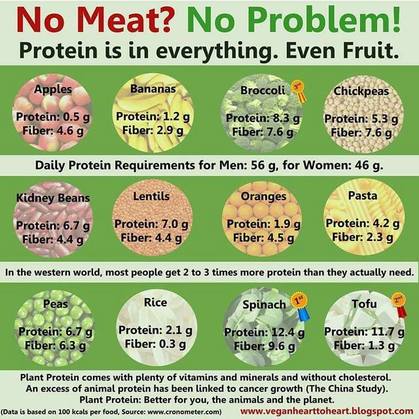|
5/26/2015 4 Comments Proteins and Diet Americans generally eat more protein that they require to repair tissue support metabolism. Excess protein is uses as an energy source and if not needed will be stored as fat. The building blocks of proteins are amino acids. Your body can make most amino acids, but it cannot manufacture a few, so it is essential to get them from your diet. These are called the "essential amino acids" (AAs), You should eat all of the essential (AAs) each day, but it is not necessary to have them all at one meal. You can easily get most of the essential AAs even if you are vegetarian or vegan. However, there are two AA's that are more challenging to obtain from vegetable sources; L-Lysine and L-methionine. These two amino acids are abundant in meat, but not in veggies/fruits. L-Lysine increases the intestinal absorption of calcium and eliminates its excretion by the kidney, suggesting that it might be helpful in osteoporosis. L-Lysine plays a major role in building muscle protein and tissue repair. It is essential in the production of hormones, enzymes and antibodies. L-Lysine has been investigated for its effects on lowering glucose, and improving anxiety. L-Methionine is responsible for supplying sulfur and other elements used for metabolism and growth. Existing conditions, including allergies, liver conditions or urinary tract infections, can lead to a higher rate of use of L-methionine by the body, which is why it is necessary to consume more foods which contain this amino acid. Deficiency of L-methionine can cause or exacerbate depression and allergies and lead to an excess of toxins. Low intakes of L-methionine during pregnancy have been associated with neural tube defects in newborn children. Excessive amounts of methionine in the diet may increase blood cholesterol levels, which could lead to atherosclerosis and cardiovascular disease. This effect appears to be present especially if there is an inadequate intake of folic acid, vitamin B6 and vitamin B12. As L-methionine is fairly soluble, foods containing L-methionine shouldn’t be boiled or soaked for too long, as this can result in significant amounts being washed out, leaving only a small amount for the body to absorb. PROTEIN REQUIREMENTS: Babies need about 10 grams a day School-age kids need 19-34 grams a day Teenage boys need up to 52 grams a day Teenage girls need 46 grams a day Adult women 46 grams a day Adult men 56 grams a day PROTEINS PER SERVING: Meat (any animal) - 85 grams (3 oz serving, size of a deck of cards) Egg - 6 grams (50g per large egg) Rice and beans - 21grams (16 oz serving, 1 cup) Quinoa - 24 grams (6 oz servin, 1 cup) L-LYSINE REQUIREMENTS: About 2.5 grams / 100 lb / day METHIONINE Requirements About 1 gram / 100 lb / day GOOD SOURCES OF BOTH L-Lysine and L-Methionine Eggs Dairy Legumes GOOD VEGETABLE SOURCES OF L-Lysine Pistachios Amaranth Quinoa GOOD SOURCES OF L-Methionine: Meat, fish and dairy products Nuts, especially Brazil nuts Sesame seeds Soya beans Some Vegetables can also CONTRIBUTE to an adequate supply of L-methionine: Potatoes Broccoli Spinach Oranges Avocados Sprouts References:
4 Comments
|
Archives
September 2022
CategoriesAll Activator Allergy Anxiety Applied Kinesiology Autoimmune Disease Back Pain Back Spasm Blood Pressure Breastfeeding Bunions Cancer Cancer And Sprit Chiro Saves Money Depression Disc Disease Energy Work Flu Foot Pain Green Smoothies Gut Health Healthy Boundaries Heart Disease Hip Flexor Home Care Hormone Disruptors Immune Strength Juicing Kidney Liver Love Neck Pain Newborn Nutrition Piriformis Syndrome Posture Protein And Diet Psoas Reiki Scar Reduction Sciatica Second Career Skincare Sleep Spinal Arthritis Stand Up Desks Stress Stroke Traction Types Of Stress Yoga Sandals |
